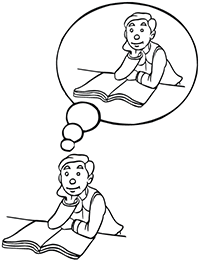I sat for a considerable amount of time just trying to get my head around the fact that I was about to write a reflection on the theme of ‘reflections’.
The word reflection can mean one of two things. When something is a reflection of another it provides a mirror image of what you are seeing. However, in this case I am referring to the act of reflection; the ‘doing’ as oppose to the ‘seeing’.This is when you step back from a situation and look at what went right, what went wrong and what you could do to make it better the next time.
The act of reflection is something which is being used more and more in the education system as it is seen as an important way for people to move forward in their learning journies. Is it worth doing a task if it isn’t followed by a time of reflection? Is it important to stop and think about what has been learnt? Is there anything that could have been done to make it better?
I think the answer is that reflection is a vital part of the learning process. From what I have understood it is a way of consolidating knowledge, learning something new and learning how to tackle problems to prevent them from occurring in the future.
The well known phrase ‘we learn from our mistakes’ is describing the act of reflection. Not only are we learning from our mistakes but we learn from our successes and repeat them in the future.
The act of reflection is often displayed as a circular diagram:
This highlights that being able to reflect on a situation is very much about being in touch with your feelings. This doesn’t mean that if something has made you feel sad you should sit and have a good moan. Reflection is about asking yourself why it has made you sad and what you can do to prevent it from happening in the future. The same can be said for the positive; if something has made you happy, think about why that was and replicate it in the future.
The biggest question with reflection is ‘why?’. Although it is such a little word it can be a massive question. Why do things happen? Why has it gone well? Why has it not gone well? Why not? Why has it made me feel great? Why has it made me feel rubbish? Why do people not understand where I’m coming from? Why do I not understand where other people are coming from?
With so many questions, coming from one little word, you can see why it is important to stop and reflect. If all of these questions remained unanswered then there would be a tendency for people to get into arguments or become completely overwhelmed by a situation.
As someone who has always been very in touch with my feelings, I find that reflection is something which comes quite naturally to me. There will be many situations in life where we reflect on things and then change our actions as a result, without intentionally meaning to ‘reflect’ on the situation. For example if you bought some bananas from Tesco and then realised they were cheaper in Lidl, the next time you would buy them from Lidl because you have reflected on what mistake you made the first time and changed the outcome in the future.
I think it is important to actively reflect on teaching practice as it is the only way that we will grow as teachers, focusing on what works and learning from our mistakes.



